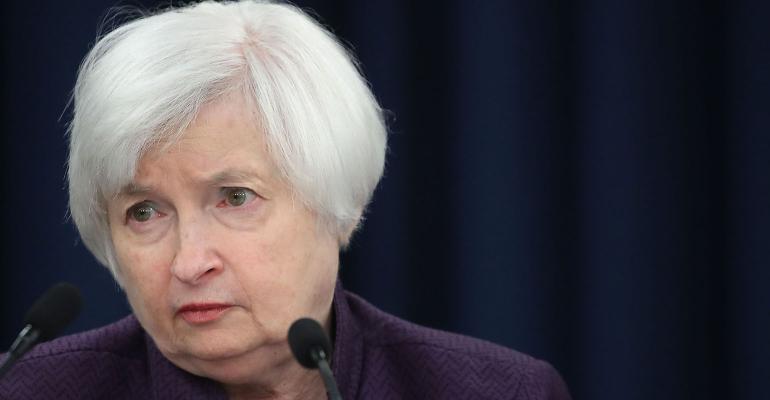Former Federal Reserve Chairwoman Janet Yellen assured advisors Tuesday at Charles Schwab’s annual Impact conference that, despite the recent fall off in the markets, the U.S. economy overall is in good shape; it's the role of the U.S. in the global economy that worries her.
When a conference attendee asked Yellen what kept her awake at night, the economist pointed to the trade dispute between the U.S. and China; Not just the potential impact a trade war would have for each country, but the message that the dispute is sending trade allies.
“I do worry about the U.S. role in the global economy,” Yellen said. “I’m concerned about the U.S. abandoning what has been a very stabilizing and constructive role in the world economy in the post-war period.”
For decades, the U.S. has succeeded in convincing other countries around the world that fewer trade barriers are mutually beneficial, Yellen said. However, she thinks the trade policy offensive against China has other U.S. partners puzzled. Yellen told attendees she has met President Trump only twice and described their personal conversations as reasonable, but she too is without answers regarding the administration’s trade policies.
“I must admit, I don’t understand what President Trump’s priorities are in terms of trade,” Yellen said. “Perhaps we don't see a general shrinkage of trade, but I think this is a world of uncertainty for multinational businesses who can potentially see significant disruptions to supply chains.”
Trade policies detrimental to foreign multinationals might benefit some U.S. companies but that isn’t guaranteed, and trade tensions are contributing to the market uncertainty this past year, according to Yellen.
But for now, Yellen sees the current U.S. economic expansion - GDP growth hit 3.5 percent in the third quarter, or 3 percent annualized - extending through 2019, and said that it will end up being the longest expansion in the county’s history.
“Nothing not to like, which is great, but the question is, where is it headed?” Yellen said about the unemployment rate and the U.S. gross domestic product. “I’m worried that the economy might overheat.”
More specifically, Yellen said the number of jobs added is “running at a faster space than is sustainable given the tightness of the labor market.”
Meanwhile, she said that although the Fed has taken its foot off the accelerator and raising rates at “measured pace,” the central bank’s real interest rate–the interest rate that takes into account inflation–is still historically low and that the Fed is likely seeking a nominal rate of 4 percent in the coming years. Assuming inflation remains near 2 percent, a 4 percent Federal-funds rate would roughly equate to the Fed’s goal of a 2 percent real rate.
President Trump has blamed the Fed for the recent stock market rout, claiming the central bankers under chair Jerome Powell have "gone crazy" by raising rates amid low inflation, deflating asset prices. Yellen pushed back agains that criticism Wednesday, saying Trump's rhetoric threatens to undermine public confidence in the legitimacy of the institution. She said she had confidence in Powell, and that she agreed on the schedule of rate hikes the Fed has outlined.





